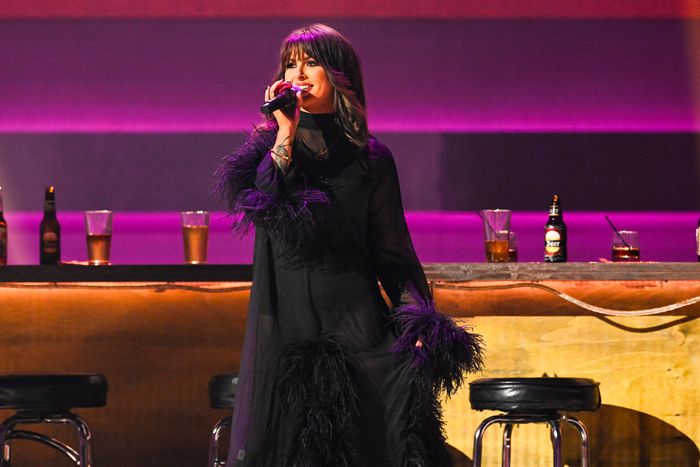A Woman Is Finally Having Fun at the Top of the Country Charts

Photo: Astrida Valigorsky/WireImage/Getty Images
For the first time in 51 weeks, a woman has the No. 1 song at country radio. Ella Langley’s heart-eyed honky-tonk duet with Riley Green, “you look like you love me,” summited the Country Airplay chart this week, breaking the second-longest streak without a woman in the top spot since Billboard launched the chart in 1990. It saves country radio the embarrassment of going a full year without a woman having the genre’s most-listened-to song. But “love me” also calls attention to another worrisome on-air trend: It’s the first time in years a woman has achieved a fun No. 1 song.
“Fun” is hardly a measurable quality — a bit of a “you know it when you see it” — but let’s say it’s the kind of song you want to hear on a Friday night. Before “love me,” the last time we had one of those by a woman top radio was nearly three years ago, with Miranda Lambert and Elle King’s “Drunk (And I Don’t Wanna Go Home),” a glittery duet about a wild time out. Since “Drunk,” women have accounted for just six No. 1s total. Other than Langley’s, all of those tracks have skewed toward the emotional, sentimental, or dramatic. These are ballads about cheating and addiction, and reflections on wistful memories and true love. Yes, there’s room for all of that in country music. But when a female artist’s best, or only, route to success is performing emotional labor through song, it perpetuates sexist stereotypes while narrowing the scope of their art.
Of course, men have never needed to worry about that. Artists like Morgan Wallen, Hardy, and Post Malone have led a rowdy new wave in country music over the past few years. They’ve dominated the charts with a steady stream of lighthearted, party-ready, and (yes) fun hits about all the old clichés: drinking, girls, trucks. Some industry watchers wondered if the bro-country of the mid-2010s was on the outs this decade, but a new generation is clearly keeping it alive.
Male artists still have the ability to show emotion when they want to — Luke Combs and Jelly Roll have made those songs their bread and butter on the charts. But women aiming for hits don’t get the same chance to be multifaceted. Outside of Langley’s “love me,” country programmers continue to snub fun songs by women with hit potential, like Dasha’s TikTok-viral stomp “Austin” (which peaked at No. 8) or Megan Moroney’s breezy ex-girlfriend anthem “I’m Not Pretty” (which peaked at No. 14). Before “love me,” the highest-charting song by a woman this year was Ashley Cooke’s “your place,” a breakup ballad, at No. 2. Even Lainey Wilson, the most successful woman in the genre right now, isn’t immune: Her rubber-burning love song “Hang Tight Honey” was one of country’s most dynamic singles in years, yet stalled out at No. 13. Her label replaced it with a slower, more classic love ballad, “4x4xU,” which is currently climbing at No. 14 and looks likely to eclipse “Honey” next week. Wilson has her share of playful and upbeat tracks, but all four of her radio No. 1s thus far have been more sentimental.
Boxing women into one type of song is a regression from the progress they were making in country music just a few years earlier. The decade kicked off with cautious hope, and in 2020, women charted a banner eight No. 1s, spanning acidic breakup stories to sunny love songs. “Drunk” marked the first time in nearly 30 years that a duet between two female soloists topped radio; a month later, it happened again with a ballad. It seemed like the paths to success for women were widening. But radio quickly decided that progress was too much, leading to a drought. This has happened before in the genre, when the early 2000s brought a record low for No. 1s by women, after the record highs of the 1990s. Again, women went nearly three years without a fun No. 1 (from Jamie O’Neal’s “When I Think About Angels” in August 2001 to Gretchen Wilson’s “Redneck Woman” in May 2004).
“You look like you love me” is a positive sign. Behind the cutesy, ’50s-inspired sound, this is a pretty progressive track, in which a woman buys a man a drink and invites him back to her place. But Langley is still an outlier on the week’s full chart — the next song by a woman is Koe Wetzel and Jessie Murph’s “High Road,” about a turbulent relationship, at No. 4. If “love me” is a sign that the past few years were just a blip rather than a trend, then country radio will need to show us by elevating more rowdy songs by women in 2025. Women will keep making them regardless — it’s up to country programmers to join the fun.





